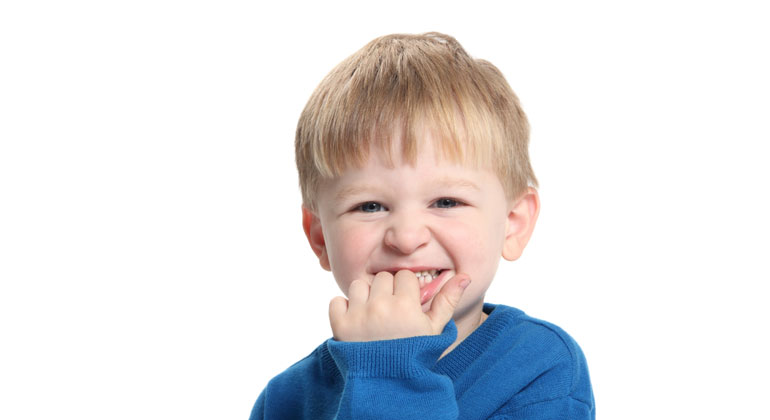Chew on This: Strategies for Responding to your Child’s Biting

Getting a call from your child’s teacher, only to learn that they have bitten one of their peers or have been bitten by someone, can be alarming for parents. Not knowing how to react or what to do can often leave you feeling helpless. It is important to understand that biting is a normal developmental phase often seen in infants, toddlers, and two-year-olds. When children lack the language to express their emotions, they might bite to quickly communicate how they feel. The good news is, as children grow and mature, they develop better self-control and problem-solving skills, and typically outgrow this behavior.
Why do young children bite?
Children might bite for a variety of reasons including:
- To explore using their mouths
- To relieve pain from teething
- To satisfy a need for oral stimulation
- To investigate cause and effect
- To communicate their underlying wants or needs (i.e., being hungry or tired)
- Because they lack self-control and react more impulsively
- To communicate or express big feelings (i.e., anger or frustration)
- To get attention
- To feel powerful and in control
- Self-defense
It is important to stay calm when biting occurs, and to try to assess the underlying reason for the behavior. Once you can get at why the biting is happening, you can come up with an effective solution and teach your child the skills they need to be successful.
Helpful strategies to try:
- Help your child learn to identify and label their feelings and those of others by narrating the experience for them. For example, “I can see that you really want that ball. You seem frustrated that you have to wait your turn. I can help you wait or find something else to play with.”
- Help your child find appropriate ways to get your attention, particularly by providing specific praise for positive behaviors. If your child is biting to get attention, keep your reaction non-emotional to avoid teaching them that biting has a big effect on adults.
- Offer your child a teething ring or a chewy toy, especially if your child is teething. Chilled teethers can also soothe sore gums. Offering crunchy foods such as crackers or pretzels throughout the day may also be helpful.
- Make sure to have age appropriate expectations for your child, and know your child’s abilities and limitations. When you expect too much or too little from your child, it can lead to frustrations for both of you.
- Provide your child with a consistent schedule and routine. Young children thrive on predictability and learn from repetition. They like and need to know what is happening next, which helps lesson their anxiety and promote positive behaviors.
- Use “When/Then” statements, which is a simple instruction that tells your child what they must do to earn a desired outcome (i.e. “When you put on your shoes, then you may go outside and play”.)
- Offer activities that are relaxing and calming for your child such as yoga, play-dough, reading books, bubbles, or anything else they find calming.
- For the time being, try and avoid roughhousing and blowing raspberries with your child. It is difficult for children to differentiate between why these interactions might be enjoyable at home, but their friends do not like it at school.
- If you see a biting incident, respond quickly to the child that did the biting, and in a firm tone say, “No biting. Biting hurts.” Avoid giving too much attention to the child that has bitten. Respond to the person that was hurt by offering comfort and performing first aid if necessary. The child who did the biting can help comfort the other child by offering an ice pack, band-aid, or hug, if the child that was hurt is comfortable with it.
- Avoid labeling a child as a “biter”. Labeling children can lead them to take on the identity assigned to them, which can intensify the biting behavior, rather than eliminate it.
- Never bite a child back to show them how it feels, and avoid getting angry, yelling, or shaming a child who has bitten.
- If biting continues, set up a meeting with your child’s teachers so you can come up with a plan for addressing the behavior that can be applied consistently at home and at school. Together you can discuss ways to replace the behavior and encourage more positive interactions.
- Be patient and remember that it takes time to change behavior.
Book Recommendations for children:
- Teeth Are Not for Biting by Elizabeth Verdick
- No Biting! by Karen Katz
- When I Feel Angry by Cornelia Maude Spelman
*If biting continues for an extended period of time, it can be helpful to check with your child’s pediatrician to rule out any medical concerns.
by Jamie Decker, LCPC
JCC Chicago Early Childhood Social Services
Our educators and full-time on-site social services team is focused on social-emotional learning to build resiliency and help students adjust to our new world. Helping children understand and manage their emotions, feel and show empathy for others, establish healthy relationships, and make responsible decisions are the cornerstones of growing great people. These 21st century essential skills address learning deficits that children are experiencing due to the pandemic!






